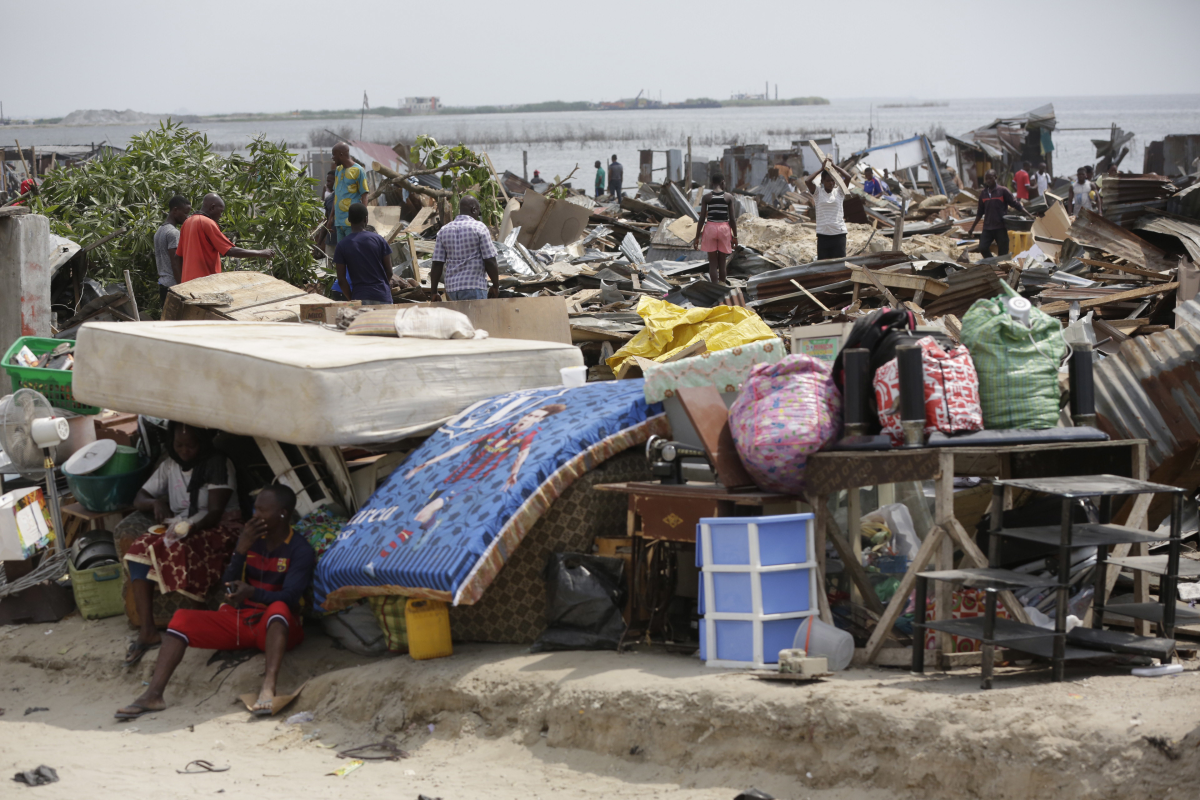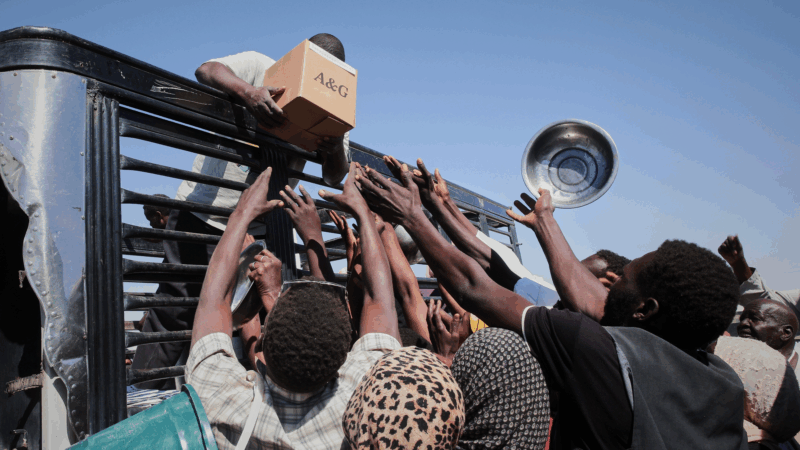A Lagos community, destroyed in one day
LAGOS, Nigeria—A century old riverside community of more than 9,000 people located in Nigeria’s largest city, Lagos, was demolished on Friday and residents were forcefully evicted.
Dozens of Lagos state officials, as well as police and young men known locally as “area boys” armed with machetes and clubs entered the community of Ilaje-Otumara in the early hours of Friday, forcing thousands to flee with their belongings, as bulldozers rolled through homes, businesses and places of worship.
NPR witnessed state government officials and police watching on as residents were beaten and attacked and forced to leave without their possessions. Reporters covering the demolition, including from Agence France- Presse, were also threatened and forced out of the community, and prevented from recording evidence of the demolitions.
Mass demolitions of largely poor inner-city or waterfront communities are common in Lagos. In 2017, Otodo-Gbame, a community of 30,000 people were evicted, despite orders prohibiting it. In Tarkwa Bay, a coastal community, close to 5,000 people were evicted in 2020.

In 2017, A Lagos State High Court barred the state government from evicting residents from Ilaje-Otumara and other communities in Lagos under threat of eviction without providing an alternative settlement.
In the judgement, the Court described attempts to evict the residents as “unconstitutional” and “an infringement on their fundamental right to protection from cruel and degrading treatment”.
But in February this year, state government officials returned to mark the community for demolition and gave residents 15 days to evacuate.
On Friday residents of Ilaje-Otumara, woke up to demolition equipment and armed men, giving them only moments to collect their belongings and leave. Hundreds of residents fled clutching their belongings or carrying them away on their heads, to the surrounding streets. Heaps of personal items were left on the roadside by many with nowhere to go.

Yemi Oladapo, a single mothers said she was driven away by gunmen as she tried to pick her belongings from her demolished home.
“No notice, nothing. They didn’t even give us another space to go to. And no compensation,” she said. “Are we not Nigerians? Are we not human beings?”
Just Empowerment Initiative, a Lagos-based rights group helping Ilaje-Otumara and several other communities, said the destruction is just the latest in a series of demolitions mainly targeting riverside communities in Lagos, which are considered prime sites for luxury housing developments. The Lagos real estate market is worth billions of dollars and over 40 percent of Lagos’ real estate is investor-owned.
The community first settled there in 1920, with many families spanning multiple generations, owning government issued documents proving their rights to their land and property. But threats of eviction have intensified over the last decade. Some residents said they were resigned that the government could force them out but pleaded with officials to move them elsewhere.
45-year-old Albert Bamidele has lived in Ilaje-Otumara for 30 years, said that he had hoped that if they did face eviction, it would be done with dignity. But on Friday, that wasn’t the case.
”All of a sudden, we saw them this morning with bulldozers. Not even giving time. Just demolishing our property. Beating people. Carrying sticks, cultasses, other dangerous weapons. We’re not even saying we won’t go, don’t just treat us this way.”
62-year-old Adeto Banbade was born in Ilaje-Otumara and lived in a family home in the community with her children and 85-year-old mother. She said they were forced to leave most of their possessions and had nowhere to go.
“I’ve never slept on the street all my life, but now in my twilight years, this is what they’ve done to me.”
Light from satellites will ruin majority of some space telescope images, study says
Astronomers have long been concerned about reflections from satellites showing up in images taken by telescopes and other scientific instruments.
Defense Department is reviewing boat strike video for possible release, Hegseth says
In a speech on Saturday, Defense Secretary Pete Hegseth defended the strikes, saying: "President Trump can and will take decisive military action as he sees fit to defend our nation's interests."
Bama, Miami in, Notre Dame out and Indiana No. 1 in College Football Playoff rankings
Nobody paying attention for the past 24 months would be surprised to see Indiana – yes, Indiana – leading the way into this year's College Football Playoff.
McLaren’s Lando Norris wins first F1 title at season-ending Abu Dhabi Grand Prix
Red Bull driver and defending champion Max Verstappen won the race with Norris placing third, which allowed Norris to finish two points ahead of Verstappen in the season-long standings.
A ban on feeding pigeons ruffles lots of feathers in Mumbai
The pigeon population has exploded — a result of people feeding the birds. For some it's a holy duty and a way to connect to nature. Critics point to health risks tied to exposure to pigeon droppings.
UN humanitarian chief: world needs to ‘wake up’ and help stop violence in Sudan
The UN's top humanitarian and emergency relief official has told NPR that the lack of attention from world leaders to the war in Sudan is the "billion dollar question".








